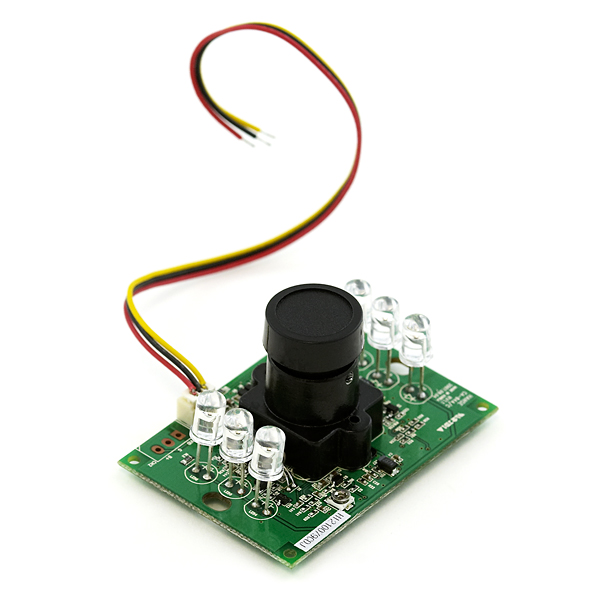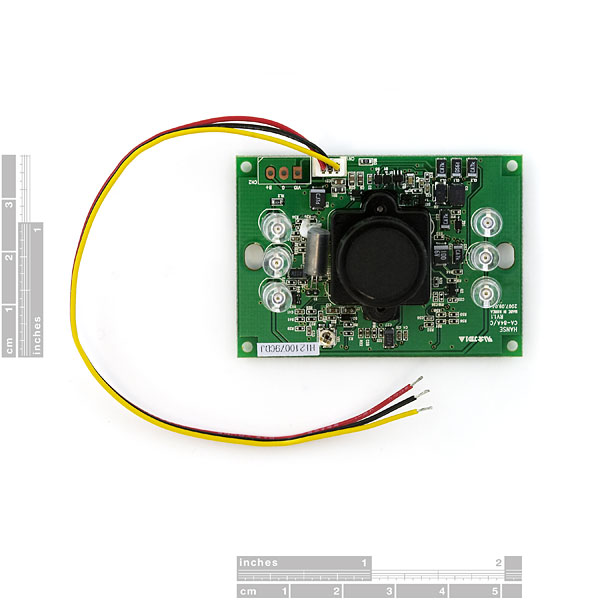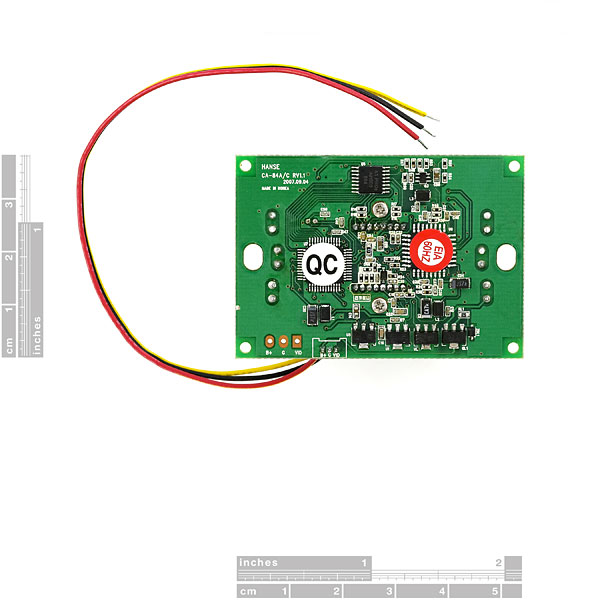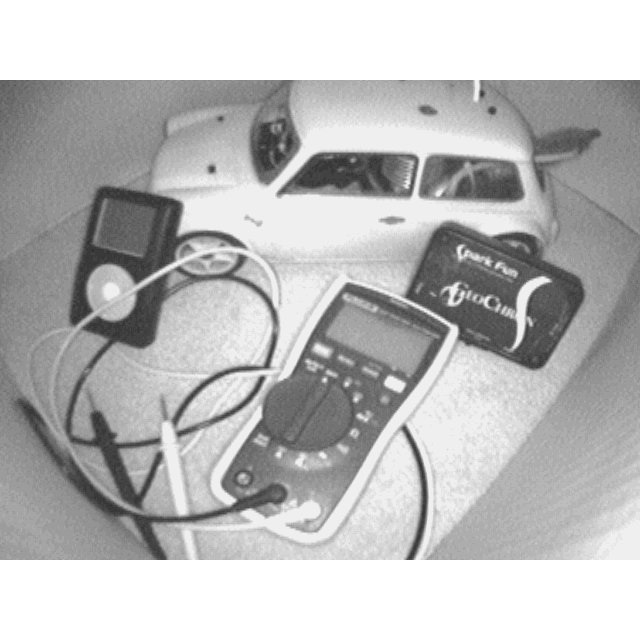CMOS IR Camera Module - 500x582
Replacement: None we are no longer carrying this CMOS IR camera in our catalog. This page is for reference only.
This is a high-quality black and white CMOS camera module with high-power infrared LEDs to light up the night. Power the CA-84AC module, hook up any display, monitor, or LCD screen with an RCA input and get vivid black and white video at 500x582 resolution even in completely dark environments. Module is easily mountable and should be powered close to the 12V spec. Comes with high quality optics, all the on board circuitry to output RCA signal, and cable harness.
- 12V@150mA
- 6 IR LEDs for night time illumination
CMOS IR Camera Module - 500x582 Product Help and Resources
Core Skill: Programming
If a board needs code or communicates somehow, you're going to need to know how to program or interface with it. The programming skill is all about communication and code.
Skill Level: Competent - The toolchain for programming is a bit more complex and will examples may not be explicitly provided for you. You will be required to have a fundamental knowledge of programming and be required to provide your own code. You may need to modify existing libraries or code to work with your specific hardware. Sensor and hardware interfaces will be SPI or I2C.
See all skill levels
Core Skill: Electrical Prototyping
If it requires power, you need to know how much, what all the pins do, and how to hook it up. You may need to reference datasheets, schematics, and know the ins and outs of electronics.
Skill Level: Rookie - You may be required to know a bit more about the component, such as orientation, or how to hook it up, in addition to power requirements. You will need to understand polarized components.
See all skill levels
Comments
Looking for answers to technical questions?
We welcome your comments and suggestions below. However, if you are looking for solutions to technical questions please see our Technical Assistance page.
Customer Reviews
No reviews yet.





yea 1 thing you guys might want to mention is that you need to take the cap off the top if you want it to work. that took me a minut to figure out.
is there a way i can contact you ? i have some questions.
I was looking at the picture from the camera in the description... why is there a giant iPod in your garage?
are you joking?
No, it is a serious question, at least to me.
@shaunb / @sblaszak
A color camera takes data about the intensity of reddish light, the intensity of greenish light, and the intensity of blueish light. This results in three images whose pixels represent the intensity of light impacting the imaging chip at that coordinate in that color range. When you put three such images together representing RGB, you get what looks like a color image.
For an infrared camera, it only takes data about the intensity of infrared light. This gives you an image which shows the intensity of infrared light at a given coordinate. Since there are no other colors to combine this with, and since infrared is not a color you normally see much of, the image is shown in black and white. A black and white image is just an intensity plot which shows the amount of incoming light at a given coordinate.
does it works with a display that only has a composite input?!?
Hi, if this is the same module I think it is, B&Q had these a while back. Can someone who has a broken one please take it apart and see if it has a bare chip, if so then there will shortly be an article posted in a magazine with a bit of luck that describes how to turn it into an alpha radiation sensor.
A lot of the less expensive units use bare chips as the outer case protects it. thanks!!
Is this available with variable zoom?
Can anyone point me to a small screen capable of accepting this input? The sparkfun displays only accept digital interfacing.
It's PAL. I hooked it up to my oscilloscope and verified that it has a 50 Hz refresh rate. That's 25 frames per second including interleaving. It does not work on my NTSC TV here in the US. However it appears the board is capable of either. It's the same board if it's the A or C model, but with different components or a jumper in the right place. I can only spot one place on the board labeled as C53 which has no attached component. I would guess that if I had the right cap in place there it would change the refresh rate.
who know how to determine the video signal output of this camera? either EIA/NTSC or CCIR/PAL.. i already tried with TV, but both mode on AV produces video..
I feel like a scrub for asking, but, can anyone tell me why there is CH1 and CH2 there? Is there something wrong with the original RCA cable?
When will be this product available in stock ? i need to buy asap.
Can someone tell me if this camera can see a laser pointer? Do I need an IR laser? I read in the comments on the "laser card" that removing it IR filter was dangerous? Is this true?
I was waiting for this camera for 3 weeks now. Just hooked it up to a 5v power supply and an RCA out. For some reason a small amount smoke came out of the back and it is not working at all. Anyone had the same problem?
Just got this and it is SWEET and very high quality. (you sure its only 500x582 it looks better than my 1900x1200 cam :)
Hi MattCF.
I'm new working with IRs and I've got two questions for you :P
Without the IR LEDs, can you see the IR of a human body(like a "thermal camera")?
And... can you upload a short video of the camera working?
Thanks in advance.
Pitter: This camera picks up near infrared, around the same wavelength as that emitted by the IR LEDs mounted on it. To see the heat of a human body, you'd need a camera that's sensitive to far infrared of much longer wavelengths. That's why those FLIR cameras are so expensive, a regular CCD isn't sensitive to the right wavelengths for such cool blackbody radiation.
However, you could pick up the light from something that is slightly cooler than "red-hot". For instance, fireplace embers will appear to have a larger "hot" surface than they do to the naked eye.
I see that it's already set up to output an RCA signal, but how would I connect this to an RCA cable?
...You shop on this site and you really do not know, dont worry just kidding there is an RCA connector in the related product posts just solder the wire to the correct terminals and you are golden (outside is GROUND inside is +SIGNAL) have fun.
Is there any chance we could get a version of this without the IR LEDs included? Or failing that, what would be the best way to disable them? Also, how hard is it to convert this to a digital signal capable of being used from say an mbed or Arduino?
How would I connect this to picaxe(I'm a real novice to this)?
Which end is up?
Is it possible to connect this to an Arduino Duemilanove for example?
The video output is already setup for connecting directly to a display (via the RCA jack). For connecting to an Arduino, you would need to convert it to serial. You might want to just look at our serial cameras.
any idea when this camera are going to arrive??
How does this get connected to the RCA Jack and cables?
The datasheet posted does not match the product I received. Your images are the same but not the spec sheet. Instead look here: http://www.hanseelec.com/product/view.asp?board=han_prod&code=CAM-013&page=2&ku=CAMERA&searchstring=
what happens if you get outside of the 12V range. will it damage the unit or will it just not work?
Most likely powering it with more than 12v will cause a wormhole to appear on your workbench. Everything within a 1 mile radius will be swallowed up, including yourself. But seriously, the input voltage is 12v +-1v, so if you adhere to that you should be fine. Anything far beyond that will either make the unit run unreliably, warm, or not allow it to run. Electronics fail in random ways it seems.
Do you guys have any small LCD with an RCA input or a tutorial on how to change it to work with a serial connection.
Please email tech support directly at techsupport@sparkfun.com. Thanks.
Anyone know if I can send images from this with an arduino via Xbee?
@shaunb: Color cameras always have IR filters on them because the IR light that digital camera sensors are sensitive to will distort the colors/lighting of any picture taken with a camera without a sensor. Likewise, I'm assuming, they put a visible light filter on all cameras sold as dedicated IR cameras (like this one). Since humans can't see IR frequencies (and, for that reason, displays aren't designed to be able to reproduce true IR images) it makes sense that all images recorded by IR cameras are converted to black and white, by default, when displayed.
On an unrelated note, I just wanted to clarify a minor mistake in the specifications given in the above description. The real resolution for this camera is 500x582 pixels. As I said, it's a minor difference but, sometimes, it's those minor difference that can make a huge difference to someone's project.
Hey sblaszak,
Thanks for the information on the resolution. I have corrected the spec. We try to get them all right, but sometimes an incorrect spec slips through the cracks. Thanks for the correction.
Hi! Is there a way to get color video from this device? Thank you!
Why is this module black and white while the other camera is full color (other camera --> https://www.sparkfun.com/commerce/product_info.php?products_id=8739 ) is it because this camera is ir, also, is the other camera capable of recieving ir radiation or is there a filter?
would really like this in a digital output. Please?
how would i hook this up to this ?http://www.sparkfun.com/commerce/product_info.php?products_id=8538
Awesome little camera, amazing video quality!
Hey anybody know what wavelength range this picks up?
That is a good question and one I am curious about myself. I couldn't find anything on the datasheet.
how to connect this camera to PC?
You could have it digital out, id just convert it to digital signal from the anoglue sampling.
Might be a little tricky but you can do it.
I would too
Would love something just like this, but digital out.
I think SF sells an analog to digital converter... maybe it's the other way around though
yup it's analog to digital